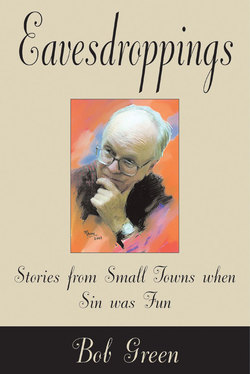Читать книгу Eavesdroppings - Bob Green - Страница 12
На сайте Литреса книга снята с продажи.
Оглавление4 Fun and Fear Before Television
In the 1930s and 1940s small-town streets were illuminated mainly by 250-watt bulbs every 100 feet or so on hydro poles. The bare bulbs were screwed under corrugated metal reflectors that were painted white on the underside and resembled straw hats. The flickering twenty-five-cycle current allowed wan circles of light under the bulbs and dark shadowy spaces in between where a person might stand unseen.
Children loved to play games in these checkered spaces of light and dark: hide-and-seek, kick the can, et cetera. And because the streets were as safe as the unlocked churches, parents trying to listen to their radios over the noise of children wrestling in the living room would say, “It’s dark now. Why don’t you kids run outside and play until it’s time for bed?”
The long nights of autumn when the sun set before seven allowed the boys on Lowrey Avenue and Chalmers Street to prowl the town before bedtime. Sometimes we stuck close to home and goaded selected fleet-footed men into chasing us. We did this simply by tapping on their front doors.
Art Snutch was always good for a wild chase. He terrified us and we loved it. Art lived in a tiny red brick house across from Dykeman’s Variety Store on the corner of Lowrey and Pollock. One tap on his door and he was on top of us, legs scissoring in the air, hollering, “I’ll tan your hides!” He was tall, thin, and bandy-legged and could run like a deer. Ivan McQueen, who lived half a block away beside Lincoln Avenue Church, occasionally joined Snutch in the chase. Ivan, a bit paunchy and not as fleet as Art, had an ominous bass voice that threatened us from the sky. One night Art and Ivan crashed together in the dark, fell down, and limped home, holding their heads. We knew better than to laugh.
Weekend nights and a later curfew led us across town to Victoria Park and on to the spring beside the Canadian Pacific Railway tracks in Barrie’s Cut. There was a campsite there, where during the Depression men in search of work dropped from freight trains to rest for a night and share a can of beans. We reached the campsite by following a scrub-lined path that led from the top of Victoria Park to the tracks. As soon as we saw the firelight through the brambles, we dropped to our hands and knees and, like Indians, stalked the campsite until we heard the voices and smelled cigarette smoke. There was laughter and singing and sometimes a harmonica. All the men at the campsite were off westbound freights upgrade. The eastbound freights were too fast to get on or off.
Invariably, while we lurked in the grass, a westbound freight would come blasting up the grade, double-headed by steam engines with different-size drive wheels and nervous out-of-synch exhausts. After the long, doleful whistle at Blenheim Road, the cannonading exhausts blotted out all other sounds. One of us, startled by a rabbit bounding by and sensing heavier steps, would leap up and run, touching off a general panic that sent everyone racing back down the trail, shrieking and leaping over the fallen until, back in the park, we slumped gasping to the ground close to the deer enclosure where everything seemed safe.
Grenfell Davenport would say, “That was a close one. Anyone missing?”
